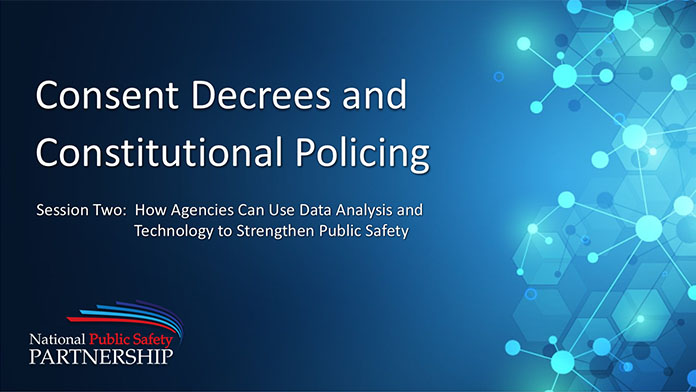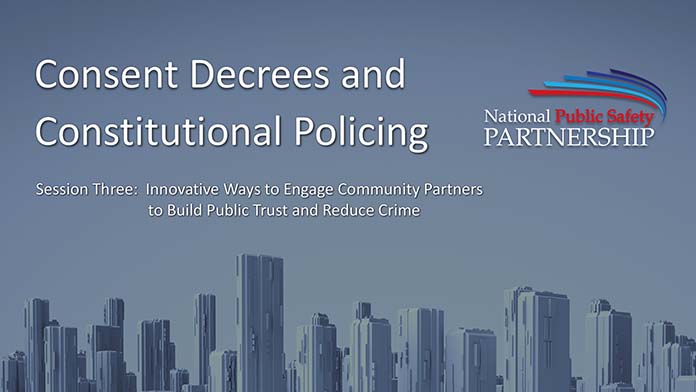Consent Decrees and Constitutional Policing
Three-part Web event series
The Bureau of Justice Assistance, the National Public Safety Partnership, and TacLogix Inc. present on-demand viewing of the three-part Web series on what agencies can learn from consent decrees, constitutional policing strategies, and successful police reform initiatives. The three sessions featured several notable guests and were moderated by Mr. Arif Alikhan, former Director of Constitutional Policing and Policy for the Los Angeles Police Department and U.S. Department of Justice official, and Geoffrey Alpert, Ph.D., professor, and independent monitor and police researcher, from the University of South Carolina’s Department of Criminology and Criminal Justice.
To view these on-demand recordings, please follow the links below.
SEP 21 2021 Session One: A Look From Within and What Other Agencies Can Learn
This Web event was the first of three sessions in a series on what agencies can learn from consent decrees, constitutional policing strategies, and successful police reform initiatives. Session One featured:
- The Honorable Susie Morgan, United States District Judge for the Eastern District of Louisiana, who oversees the federal consent decree for the New Orleans Police Department
- Mr. Charlie Beck, former Chief of the Los Angeles, California, Police Department and Interim Superintendent of the Chicago, Illinois, Police Department
- Chief Gordon Ramsay, Wichita, Kansas, Police Department, and former Chief of the Duluth, Minnesota, Police Department
The panelists explored the benefits and challenges of consent decree reforms to improve training and education, accountability systems, community partnerships, and officer wellness. They spoke from their unique experiences and perspectives as a federal judge overseeing a major consent, a former chief and interim superintendent under federal consent decree mandates at the Los Angeles Police Department and the Chicago Police Department, and as a current chief in Wichita who has keenly observed how national reforms can be used to improve police departments of all sizes and in different communities.
The 90-minute session was moderated by Mr. Arif Alikhan, former Director of Constitutional Policing and Policy for the Los Angeles Police Department and U.S. Department of Justice official, and Geoffrey Alpert, Ph.D., professor and independent monitor and police researcher, from the University of South Carolina’s Department of Criminology and Criminal Justice.
OCT 28 2021 Session Two: How Agencies Can Use Data Analysis and Technology to Strengthen Public Safety
Session Two of this webinar series was held on Thursday, October 28, 2021, at 1:00 p.m., ET. The second session focused on how agencies can use data analysis and technology to implement meaningful changes that help improve public safety.
Featured panelists included:
- Maggie Goodrich, J.D., Chief Executive Officer, TacLogix, Inc., and former Chief Information Officer for Public Safety, City of Los Angeles, California (Los Angeles Police Department [LAPD] and Los Angeles Fire Department)
- Craig Uchida, Ph.D, President, Justice and Security Strategies, Inc.
- Ms. Donna Roy, Strategic Advisor, Guidehouse, and former senior technology officer, U.S. Department of Homeland Security and Consumer Fraud Protection Bureau
- Mr. Joe Siegel, Leader, Integrated Justice and Police Accountability Practice, Gartner, Inc.
- Mr. Ben Horwitz, Co-founder, AH Datalytics, and former Director of Analytics, New Orleans, Louisiana, Police Department
Mr. Steven Rosenbaum, Chief of the U.S. Department of Justice (DOJ) Civil Rights Division, Special Litigation Section, opened the session. Mr. Arif Alikhan, former senior DOJ official and Director of Constitutional Policing and Policy for the LAPD, and Professor Geoffrey Alpert of the University of South Carolina’s Department of Criminology and Criminal Justice facilitated the discussion.
The panel focused on how data collection, reporting, analysis, and technology are critical aspects of consent decree compliance, constitutional policing initiatives, and the reduction of crime in communities. The speakers discussed their experiences with data challenges at the local and federal levels, as well as the benefits of a robust technology infrastructure for organizational effectiveness. In addition, the panelists offered insights and guidance on how to implement technology within police organizations and use research partnerships to help integrate technology into an agency’s specific environment.
DEC 1 2021 Session Three: Innovative Ways to Engage Community Partners to Build Public Trust and Reduce Crime
Session three of this webinar series was held on Wednesday, December 1, at 1:00 p.m., ET, and focused on innovative methods to engage with community partners to understand issues and work together to reduce crime and protect communities.
The session featured a unique panel of law enforcement leaders and interviews with nationally recognized National College Athletic Association (NCAA) coaches who have worked to form innovative partnerships between local police officers and student athletes. They discussed methods to create meaningful and constructive relationships to bridge gaps in trust and understanding while protecting communities and reducing crime. They shared their personal experiences with the police and ways in which they have influenced and coached young student athletes to approach the complex issues surrounding policing and society.
The interviews included:
- Dawn Staley, Head Coach of the women’s basketball program at the University of South Carolina.
- Randy Shannon, Senior Defensive Analyst for Florida State University’s football program and former Head Coach of the University of Miami Hurricanes football team.
The session also included a panel discussion with:
- Chief Ed Hudak, Coral Gables, Florida, Police Department, home to the University of Miami.
- Sheriff Leon Lott, Richland County, South Carolina, home to the University of South Carolina.
They discussed their unique partnerships with the coaches to address contemporary police issues and work together to protect their communities. The second panel focused on research regarding community engagement and effective community partnerships. It featured:
- Justin Nix, Ph.D., Distinguished Associate Professor of Criminology and Criminal Justice at the University of Nebraska at Omaha.
- Chief Shon Barnes, Madison, Wisconsin, Police Department.
Chief Barnes, a nationally recognized leader in police-community relations and a former Law Enforcement Advancing Data and Science (LEADS) Scholar with the National Institute of Justice, and Professor Nix shared their research on effective community policing programs.


